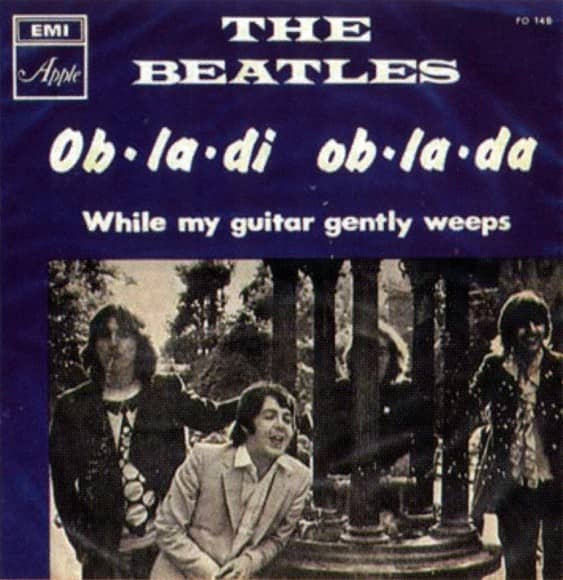Studio Two, EMI Studios, Abbey Road
Producer: George Martin
Engineer: Geoff Emerick
This session, which took place from 5pm-1.30am, was an eventful one which saw numerous overdubs added to ‘Ob-La-Di, Ob-La-Da’.
Between 6pm and 10.30pm three saxophones and a set of bongos were added to the song. The saxophonists were James Gray, Rex Morris and Cyril Reuben, while the percussionist was Jimmy Scott – whose pet phrase Paul McCartney had used for the song’s title.
Scott’s full name was Jimmy Anonmuogharan Scott Emuakpor. The phrase ‘Ob-la-di, ob-la-da’ was said to be a Urhobo colloquialism meaning ‘Life goes on’, but was actually just a family phrase.
Additional percussion – maracas, marimba and claves – were also added, from the second chorus onwards. These were recorded onto track three along with the saxophone and bongos.
Between 10.30pm and 11.45pm a piccolo was overdubbed onto track two, although this was subsequently wiped and replaced by a guitar part played by McCartney. The guitar was added towards the end of the session, and was distorted to make it sound like a bass guitar.
There were a lot of primitive things that we used to use in the Beatles — prehistoric machines. One of my theories about sound nowadays is that the machines back then were more f**k-upable. I’m not sure if that’s in the dictionary. But they were more destructible. You could actually make a desk [recording console] overload, whereas now they’re all made so that no matter what idiot gets on them, they won’t overload. Most of the old equipment we used, you could get to really surprise you. Now a brand-new desk is built for idiots like us to trample on. We used to do a great trick with acoustic guitars, like on ‘Ob-La-Di, Ob-La-Da’. I played acoustic on that, an octave above the bass line. It gave a great sound — like when you have two singers singing in octaves, it really reinforces the bass line. We got them to record the acoustic guitars in the red. The recording engineers said, ‘Oh my God! This is going to be terrible!’ We said, ‘Well, just try it.’ We had heard mistakes that happened before that and said, ‘We love that sound. What’s happening?’ And they said, ‘That’s because it’s in the red.’ So we recorded slammin’ it in the red. And these old boards would distort just enough, and compress and suck. So instead of going [imitates staccato ‘Ob La Di’ riff] dink dink dink dink, it just flowed. So, a new fuzz box just won’t go as crazy as an old one would. And it does make it all a little bit cleaner, which I’m not wild on, actually. I’m a big fan of blues records and stuff, where there’s never a clean moment. Nothing was ever clean. It was always one old, ropey mike stuck somewhere near the guitar player, and you could hear his foot more than some things.
Guitar Player, July 1990
McCartney took away a rough mono mix of Ob-La-Di at the end of the session. After reviewing it over the weekend, he decided the song required a remake, which was begun on Monday 8 July 1968. It was, however, released on 1996’s Anthology 3.



Better than the album version, imo